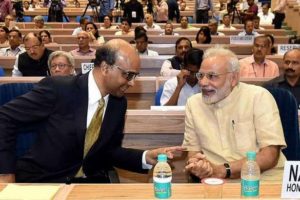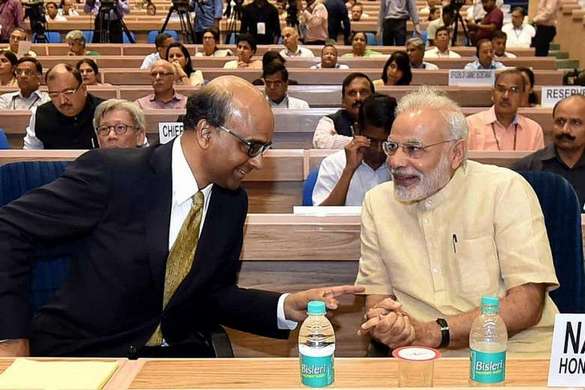
Singapore’s Deputy Prime Minister Tharman Shanmugaratnam has said that India is “uniquely positioned to recast the global narrative” to achieve prosperity. He urged India to speed up reforms and target growth of 8 to 10 per cent over the next 20 years. He also pointed out that India is facing a ‘crisis in education’ with high drop out rates.
“India is in a position different from China. And the reason why I say India is uniquely positioned to recast the global narrative is because India is also an open society,” Mr Tharman said to an audience that included the entire Indian Cabinet, top federal and state-level bureaucrats, and intellectuals in New Delhi.
“It is a constitutional democracy with a diverse population. And India can show how it is possible with an open society and an open economy to achieve not just rapid growth but inclusive growth for its people.”
He said India needs to speed up the pace of reforms, push growth of jobs in the formal sector, seek “deeper, strategic interaction with the global economy” and push exports. It also needs to resolve a crisis in education that sees 43 per cent of students drop out before finishing upper primary school, he said.
“India has the largest unfulfilled potential among the major nations,” he said.
“It needs to grow by 8 per cent to 10 per cent if it is to create jobs for a youthful population, to reduce the extensive under-employment of its population, and to achieve inclusive growth by enabling more of the large low-income group become middle-income.
“The reform agenda is largely unfinished, and the pace of change has to be stepped up to achieve these goals.”
Mr Tharman was delivering the inaugural lecture titled’ Fulfilling India’s Potential In The Global Economy’ as part of a series on Transforming India organised by government think-tank NITI Aayog.
India and Singapore have had traditionally close economic and political ties, but these have grown even more since the signing of a Comprehensive Economic Cooperation Agreement in 2005. Trade reached US$15 billion (S$20 billion) in 2015-16 according to Indian government figures and, during Mr Modi’s visit to Singapore in November last year, the bilateral relationship was upgraded to a strategic partnership.
In his opening remarks at yesterday’s event, Prime Minister Narendra Modi explained his choice of inviting Mr Tharman to kick-start the lecture series.
“One of the greatest reformers and administrators of our time was Lee Kuan Yew, who transformed Singapore into what it is today,” said Mr Modi. “It is therefore fitting that we are inaugurating this series with Shri Tharman Shanmugaratnam, Deputy Prime Minister of Singapore.”
To make his point about growth, Mr Tharman used an apt analogy for a cricket-obsessed country.
“You are on a good batting wicket but you can’t continue this process by scoring singles,” he said. “You have to go for fours and sixes in every over, and you have to go for a century… that is the only way India is going to achieve its potential in the next 20 years.” An over is a set of six balls bowled by a cricketer.
Earlier, Mr Tharman, who had also visited India in April this year, called on Mr Modi, who offered condolences over the death of former Singapore president S R Nathan. Mr Tharman briefed Mr Modi on the status of various joint initiatives between the two countries, including skills development and smart cities, said a press note from the Indian Prime Minister’s Office.
Singapore is helping India to develop two townships and set up a skills centre in the state of Rajasthan. It is also assisting Andhra Pradesh state in building its new capital city Amaravati.
During the meeting, Mr Modi told Mr Tharman that he was “keenly looking forward” to a visit by Prime Minister Lee Hsien Loong to India scheduled for October this year. Mr Tharman met Indian Finance Minister Arun Jaitley as well.


